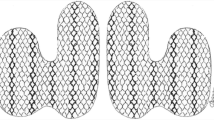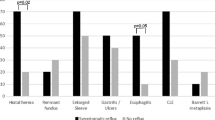Abstract
Background
Laparoscopic adjustable silicone gastric banding (LASGB) and laparoscopic vertical banded gastroplasty (LVBG) are the most frequently performed restrictive operations for morbid obesity. The question of whether bariatric restrictive procedures increase or reduce gastroesophageal reflux disease (GERD) remains open. This study aimed to compare the long-term results of LASGB with those of LVBG in terms of postoperative GERD and esophageal motility function.
Methods
From February 1999 to December 2000, 175 patients underwent bariatric surgery. After 75 of these patients were excluded from the study, the remaining 100 patients were randomly assigned to one of two treatment groups: LASGB or LVBG. The end points of the study were evaluation of clinical and instrumental GERD and esophageal function. The follow-up protocol included clinical assessment using the Gastroesophageal Reflux Health-Related Quality-of-Life (GERD-HRQOL) scale at 3, 12, and 96 months. Esophageal manometry, 24-h pH monitoring, and endoscopy were performed at 12 and 96 months.
Results
At 12 months, GERD had developed in 13 (26%) LASGB and 11 (21.6%) LVBG patients. In the majority of cases, GERD resulted from pouch dilation or poor compliance and required either reoperation (ten after LASGB and three after LVBG) or endoscopic dilation of the neopylorus (four after LVBG). In all, 71 patients completed the 96-month follow-up protocol. The findings showed that three (11.5%) of 26 LASGB patients and four (9%) of 45 LVBG patients were receiving proton pump inhibitor (PPI) therapy for GERD. Postoperative lower esophageal sphincter (LES) pressure and esophageal motility did not differ from preoperative data except for the presence of aperistaltic waves in one LASGB and two LVBG symptomatic GERD patients.
Conclusions
No significant association between gastric restrictive procedures and GERD or esophageal function was found during long-term follow-up assessment. The increased occurrence of GERD in the early follow-up period often is due to a technical defect or poor patient compliance.

Similar content being viewed by others
References
Flegal KM, Carroll MD, Ogden CL, Johnson CL (2002) Prevalence and trends in obesity among US adults, 1999–2000. JAMA 288:1723–1727
Freedman DS, Khan LK, Serdula MK, Galuska DA, Dietz WH (2002) Trends and correlates of class 3 obesity in United States from 1990 through 2000. JAMA 288:1758–1761
Martin LF, Hunter SM, Lauve RM, O’Leary JP (1995) Severe obesity: expensive to society, frustrating to treat, but important to confront. South Med J 88:895–902
Merrouche M, Sabaté JM, Jouet P, Harnois F, Scaringi S, Coffin B, Msika S (2007) Gastroesophageal reflux and esophageal motility disorders in morbidly obese patients before and after bariatric surgery. Obes Surg 17:894–900
Korenkov M, Köhler L, Yücel N, Grass G, Sauerland S, Lempa M, Troidl H (2002) Esophageal motility and reflux symptoms before and after bariatric surgery. Obes Surg 12:72–76
Mason EE (1987) Morbid obesity: use of vertical banded gastroplasty. Surg Clin North Am 67:521–537
Deitel M, Khanna RK, Hagen J (1988) Vertical banded gastroplasty as an antireflux procedure. Am J Surg 155:512–516
Naslund E, Granstrom L, Stockeld D, Backman L (1993) Vertical banded gastroplasty: one treatment for esophagitis and/or weight gain after gastric banding. Obes Surg 3:365–368
Nilsell K, Thörne A, Sjöstedt S, Apelman J, Pettersson N (2001) Prospective randomized comparison of adjustable gastric banding and vertical banded gastroplasty for morbid obesity. Eur J Surg 167:504–509
Dixon JB, O’Brien PE (1999) Gastroesophageal reflux in obesity: the effect of lap-band placement. Obes Surg 9:527–531
Belachew M, Belva P, Desaive C (2002) Long-term results of laparoscopic adjustable gastric banding for the treatment of morbid obesity. Obes Surg 12:564–568
Victorzon M, Tolonen P (2002) Intermediate results following laparoscopic adjustable gastric banding for morbid obesity. Dig Surg 19:354–358
Tolonen P, Victorzon M, Niemi R, Mäkelä J (2006) Does gastric banding for morbid obesity reduce or increase gastroesophageal reflux? Obes Surg 16:1469–1474
NIH Conference (1991) Gastrointestinal surgery for severe obesity. Consensus development conference panel. Ann Intern Med 115:956–961
Morino M, Toppino M, Bonnet G, del Genio G (2003) Laparoscopic adjustable silicone gastric banding versus vertical banded gastroplasty in morbidly obese patients: a prospective randomized controlled clinical trial. Ann Surg 238:835–842
Velanovich V, Vallance SR, Gusz JR, Tapia FV, Harkabus MA (1996) Quality-of-life scale for gastroesophageal reflux disease. J Am Coll Surg 183:217–224
Savary M, Miller G (1978) The esophagus: handbook and atlas of endoscopy. Gassinany, Solothurn
Zaninotto G, DeMeester TR, Schwizer W, Johansson KE, Cheng SC (1988) The lower esophageal sphincter in health and disease. Am J Surg 155:104–111
Ergun GA, Kahrilas PJ (1996) Clinical application of esophageal manometry and monitoring. Am J Gastroenterol 91:1077–1089
Frantzides CT, Carlson MA, Madan AK, Stewart ET, Smith C (2003) Selective use of esophageal manometry and 24-hour pH monitoring before laparoscopic fundoplication. J Am Coll Surg 197:358–363
Jamieson JR, Stein HJ, DeMeester TR, Bonavina L, Schwizer W, Hinder RA, Albertucci M (1992) Ambulatory 24-h oesophageal pH monitoring: normal values, optimal thresholds, specificity, sensitivity, and reproducibility. Am J Gastroenterol 87:1102–1110
Johnson L, DeMeester T (1986) Development of the 24-hour intraesophageal pH monitoring composite scoring system. J Clin Gastroenterol 8:52–58
Rebecchi F, Francia I, Giaccone C, Morino M (2002) Improving the analysis of esophageal acid exposure by a new parameter: area under H+. Am J Gastroententerol 97:568–574
MacLean LD, Rhode BM, Forse RA (1993) A gastroplasty that avoids stapling in continuity. Surgery 113:380–388
Toppino M, Morino M, Capuzzi P, Mistrangelo M, Carrera M, Morino F (1999) Outcome of vertical banded gastroplasty. Obes Surg 9:51–54
Schauer PR, Ikramuddin S (2001) Laparoscopic surgery for morbid obesity. Surg Clin North Am 81:1145–1179
Murray L, Johnson B, Lane A, Harvey I, Donovan J, Nair P, Harvey R (2003) Relationship between body mass and gastrooesophageal reflux symptoms: the Bristol Helicobacter Project. Int J Epidemiol 32:645–650
Delgado-Aros S, Locke GR III, Camilleri M, Talley NJ, Fett S, Zinsmeister AR, Melton LJ III (2004) Obesity is associated with increased risk for gastroesophageal reflux symptoms: a population-based study. Am J Gastroentrol 99:1801–1806
Di Francesco V, Baggio E, Mastromauro M, Zoico E, Stefanelli N, Zamboni M, Panourgia MP, Frulloni L, Bovo P, Bosello O, Cavallini G (2004) Obesity and gastroesophageal acid reflux: physiological mechanisms and role of gastric bariatric surgery. Obes Surg 14:1095–1102
Suter M, Dorta G, Giusti V, Calmes JM (2005) Gastric banding interferes with esophageal motility and gastroesophageal reflux. Arch Surg 140:639–643
Øvrebø KK, Hatlebakk JG, Viste A, Bassøe HH, Svanes K (1998) Gastroesophageal reflux in morbidly obese patients treated with gastric banding or vertical banded gastroplasty. Ann Surg 228:51–58
Gutschow CA, Collet P, Prenzel K, Hölscher AH, Schneider PM (2005) Long-term results and gastroesophgeal reflux in a series of laparoscopic adjustable silicon gastric banding. J Gastroint Surg 9:941–948
Crookes PF, Corkill S, DeMeester TR (1997) Gastroesophageal reflux in achalasia: when is reflux really reflux? Dig Dis Sci 42:1354–1361
Näslund E, Granström L, Melcher A, Stockeld D, Backman L (1996) Gastroesophageal reflux before and after vertical banded gastroplasty in the treatment of obesity. Eur J Surg 162:303–306
Disclosures
Fabrizio Rebecchi, Stefano Rocchietto, Claudio Giaccone, Ahmed Talha, and Mario Morino have no conflicts of interests or financial ties to disclose.
Author information
Authors and Affiliations
Corresponding author
Rights and permissions
About this article
Cite this article
Rebecchi, F., Rocchietto, S., Giaccone, C. et al. Gastroesophageal reflux disease and esophageal motility in morbidly obese patients submitted to laparoscopic adjustable silicone gastric banding or laparoscopic vertical banded gastroplasty. Surg Endosc 25, 795–803 (2011). https://doi.org/10.1007/s00464-010-1257-x
Received:
Accepted:
Published:
Issue Date:
DOI: https://doi.org/10.1007/s00464-010-1257-x




